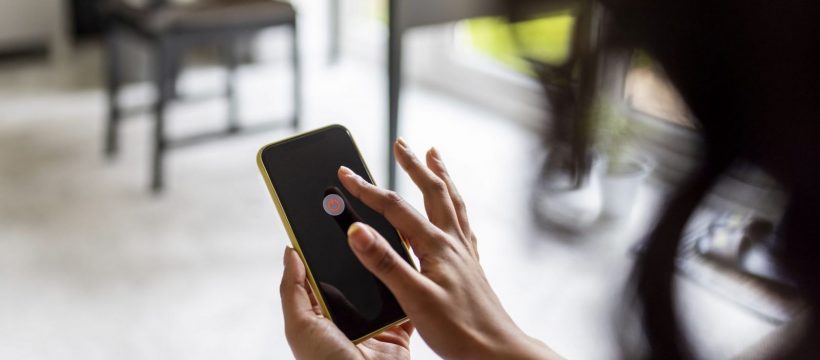If you think that you need to head to an expensive retreat to reap the benefits of going offline, you might need to think again. Strong Women editor Miranda Larbi discovered that even the shortest of circuit breakers can have a massive impact on mood, sleep and recovery.
Mention a ‘digital detox’ and it’s likely to throw up images of retreats on remote islands with no phone signal. Or a cabin with a padlocked safe for your phone that only opens after you’ve fully recovered from your TikTok addiction. But a digital detox doesn’t have to be lengthy or extreme to make a massive difference to your sleep and mood: 24 hours is all it takes.
A really decent night’s sleep is necessary for many things, but especially for exercise recovery. If you’re not getting enough deep sleep, your body can’t get rid of various toxins and your muscles won’t repair as well as they should. It’s also a good indication of your mental wellbeing: you need to feel relaxed and safe in order to fall – and stay – asleep.
You may also like
2023 should be your year of rest and relaxation – here’s why it’s time to dial down the intensity over the next few months
Despite trying to be more #SoftLife this year, my Whoop tracker keeps alerting me to the fact that I’m barely recovering between workouts. In fact, one morning, it told me that I’d only recovered by 5% overnight. My sleep is poor. And social media, I’m convinced, is partly to blame.
I spend about 90 minutes a day using my phone, which isn’t massive compared to many of my friends and colleagues, but that still means scrolling through show-offy home renovation updates, fitness reels and depressing news alerts for over an hour. Given that I work on the internet for nine hours a day, that extra dose of social media can’t be healthy.
In fact, I know it’s not doing me any favours because I’ve just done a self-imposed 24-hour social media unplug.
A couple of weekends ago, I visited Birch – a kind of communal hotel nestled just north of the M25. I’d planned to go up on Friday night for dinner, drink as many negronis as possible and stay overnight, ready for some slightly hungover yoga on Saturday morning.
I wanted to reconnect with my partner, who’s been recovering from a slipped disc and works different shift patterns to me. So we decided on one rule for our time at Birch: no social media. For 24 hours, we’d avoid looking at depressing threads on Twitter, swerve the candid Instagram selfies and tune out from the news.
Placing our phones on airplane mode, we kicked off our overnight stay with a glorious sound bath – an hour of lying wrapped in blankets, listening to the vibrations of gongs, drums, rain makers and other percussion instruments. There’s plenty of evidence to suggest that sound baths can be deeply relaxing, offer instant stress relief and boost mood. How profoundly you feel those benefits, however, depends on the state in which you arrive on your mat. We’d just arrived from the overground train moments earlier, so it took a little time to get into what was going on, but after a while, knowing there was nowhere else to be and nothing else I needed to do, I lay back and let the music wash over me.
Already feeling more relaxed, we headed for a phone-free dinner. Rather than creating Stories of my heritage carrot and tahini starter, I just… ate it. And it tasted delicious. And when one of us went to the loo, the other did. spot of people-watching rather than mindlessly scrolling.
It sounds so obvious and normal but you’d be amazed at how often we use our phones to kill little pockets of time in everyday life; whenever you’re alone and waiting, you immediately pull out your phone to look at social media. During that meal, I realised how much I miss out on by not doing anything and how overstimulated I am all the time by constantly looking at and reading a little screen.
Still dressed in our work clothes, we popped back up to the room around 8.30pm to change and freshen up, hoping to enjoy the DJ playing at the bar downstairs. Instead, we woke up at 8am.
We’d both passed out, sleeping for almost 12 hours. Maybe it was the sound bath, maybe it was the comfy bed… but I’m sure it was the screen moratorium.
I felt amazing the next morning. So good, in fact, that I didn’t want to resume using my phone. Instead of listening to BBC Sounds as usual, I turned on the DAB radio in our room. We went for a long walk, talking instead of capturing content for Instagram. We had intense chats over breakfast rather than dissecting the morning’s headlines.
But my digital detox didn’t just improve my time in bed.
As a runner, I try to have a massage every few months, and normally, I’m in agony. It’s not my hamstrings or quads that are in the most pain, it’s my upper back and shoulders – caused by desk work and stress. This time, a 30-minute massage in the wellness centre was gentle, warming and rejuvenating – no pummeling necessary.
We tried Forrest yoga for the first time (kind of like hatha, but with a few odd variations) and we both felt more emotional than usual. I wrote in my diary, finished the novel I’d been reading for months, stared out of the window at the stark winter landscape and eavesdropped on the family drama a pair of stepsisters were having behind me.

You don’t have to go anywhere to have a day off from social media, but I’ve tried for months to set aside a phone-free day, and I’ve never succeeded. When you do manage it, however, it can be transformational.
Not being on Instagram, WhatsApp or email, I was able to claw back a lot of free time (my average daily screen time is 90 minutes; it was down to 10 minutes on the Saturday). Not filling little gaps with technology made time move slower.
And most importantly, I felt really relaxed. I wouldn’t say that my social media world is particularly negative or overly stressful but just being plugged into technology all the time clearly has an impact on mental wellbeing. It takes no time to reap the benefits of going off-grid – 24 hours is a long-enough circuit breaker to feel different.
How to have a 24-hour digital detox
If you’re planning on going off-grid for a day, then it’s worth having a think about the following:
Make a date: Decide which day you’re going to go off-grid ahead of time.
What do you want to get out of going off social media? Having a purpose will make it easier to stick to and will make it easier to notice whether or not it’s had any effect.
Plan what you want to do that day: It could be something creative, reading a book you’ve not made much progress with, trying out a yoga class online or IRL, going for a long walk or meeting up with mates.
Call ahead: If you are meeting up with someone, ring them to discuss your plan of action rather than relying on WhatsApp or texts.
Think about whether or not you’ll want to take pictures. Could you take a disposable camera? Or do you need to take photos on your phone to sort through the day after?
Notice what you notice: If you tend to kill time on your phone (taking it the loo with you, scrolling while waiting for public transport or watching TV while looking at social media), see what thoughts or inspiration come up when you’re not filling those gaps. You might see or hear something interesting or your brain might, finally, feel empty.
Make notes on your findings: Towards the end of the day, reflect on how you feel without social media. Maybe you’ll feel exactly the same – and that’s great. But you may just notice that you’ve had more time on your hands – or that you’re less bothered by how other people are spending their time.
Images: Getty
Source: Read Full Article
